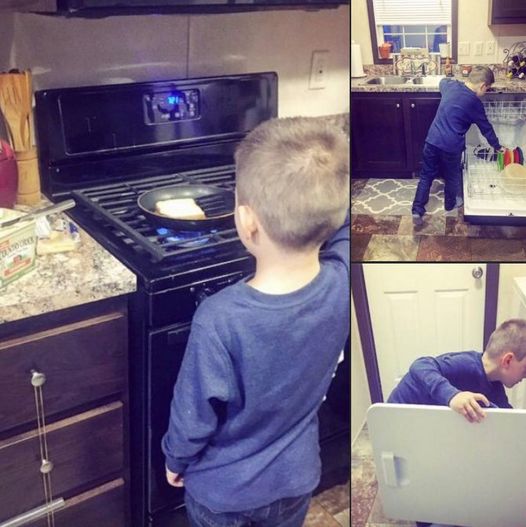
How we choose to raise our children and the lessons we decide to ingrain in them from an early age differs from parent to parent.
It’s only natural, of course. Some mothers and fathers take a more disciplined approach, for example, while others prefer to let their kids go through a try and fail cycle so that they can learn right and wrong through their own experiences.
Now, for the most part, how one chooses to style their son or daughter’s upbringing is their business, no one else’s. Yet that doesn’t stop people commenting and criticizing online every time a debate is sparked over some parental decision or another…
I remember when I was younger, doing chores was considered part and parcel of everyday life. I mean for me and my siblings, of course, not only my mother.
Doing dishes, making beds, helping to prepare food before mealtimes… the list goes on and on.
I understand times change, but in my mind getting children to help out with tasks around the house – providing there’s no danger involved – is a great way to instill values and a worth ethic that will come in handy later on.

It seems, though, that not everyone agrees. According to reports, one mother found this out the hard way a few years back after she uploaded pictures of her son and shared her method of giving him chores to do with the internet.
The mom in question, 22-year-old Nikkole Paulun, reportedly explained how she proudly put her 7-year-old son, Lyle, to work around the house, where he would help out with things like cooking and cleaning.
Nothing too dramatic, I’m sure we can all agree, but that didn’t stop online detractors from verbally attacking her and expressing concern over the potential impact on the child’s emotional well-being.
The bulk of the critics targeted the fact that the mother had shared her son’s chores online, not only potentially making other parents question themselves, but also flagging the idea that the child might not want to have his daily activities shared with a large number of strangers online.
One woman went as far as to write in the comments that Nikkole couldn’t just let her child “be your slave. Or to do the chores that you yourself don’t want to do.”
Another wrote: “So I take it you can do everything ur teaching ur son to do or are you just putting pressure on ur child?”
A third added: “Don’t get me wrong… a child should know responsibility. .. but should not be operating a stove that young.“
A fourth wrote: “Lazy mother’s are sweeping the country. It’s good to teach them while they’re young but i notice alot of these single mom’s are just raising their boy’s to be the man that they wish they always had.“
There were many who defended Nikkole in the comments, too, with her post gaining viral status after it garnered over 8,000 comments and 156,000 interactions on Facebook.
Nikkole herself insisted that she enjoys doing housework and that her son Lyle “just helps along the way & earns allowance as well.
What’s more, she added that her then-one-year-old daughter, Ellie, would be following in her elder siblings steps and doing the same thing when she was a little older.
What do you think to Nikkole’s parenting approach and the criticism she got for it? Let us know your thoughts in the comments box.
16 Photos Proving That Life in Sweden Is Nothing Like in the Rest of the World
10.4 million people live in Sweden — that’s just 2 million more than in New York City alone. But this country has just as many surprises as countries with larger populations. Maybe even more.
We at Bright Side love finding out how people in other countries live. And Sweden won over our hearts.
Swedish kebab-pizza

Diapers in Sweden have a father on the packaging.

Stockholm subway
Look at the internet speed in Sweden.
“Stayed in a Boeing 747 converted into a hostel at Arlanda Airport, in Sweden.”

“In Sweden, we get a text message when our blood has helped a patient. This is my 3rd time donating.”

Sweden has baby stroller parking spots

Swedish planes are named after famous people.

Miriam Bryant is a Swedish singer and songwriter.
The art of parking in Stockholm

In Stockholm, there are cutouts in the barrier allowing children and adults to observe the construction site/river.

A record store for mice in Lund

Chessboards on the tables in parks

These buses in Malmö, Sweden can go in both directions like a tram.

This Stockholm tree is one of the tallest Christmas trees in the world. It’s 35 meters tall.

“Saw this in a toilet in Sweden. What’s it for?”

It’s a special toilet to separate urine.
A cute traffic light in Stockholm

Have you ever been to Sweden? What impressed you the most?
Preview photo credit kc3w / Reddit




Leave a Reply